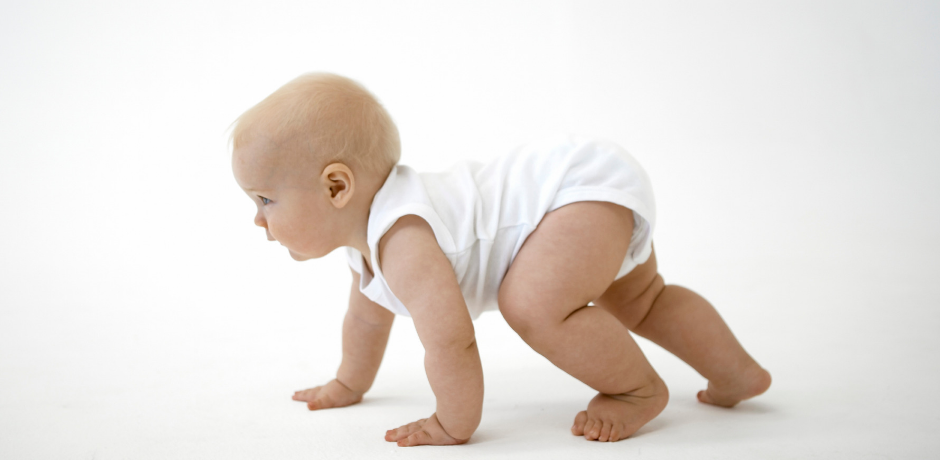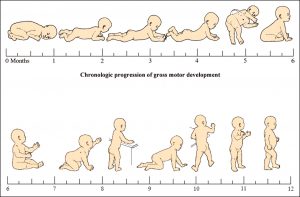Many parents muck through the four month sleep regression just to find themselves facing another sleep regression when their baby learns to roll, crawl, or walk.
Babies, toddlers, and big kids are constantly learning to use their bodies in new ways. A newborn is born not even recognizing that his hand is his hand, yet before the middle of the first year he can use that hand to grab a toy and shove it in his mouth! And within just a few fast years, those hands will be used to throw a ball and maybe even do handstands! These skills are often referred to as gross motor skills.
If you’ve ever watched your baby startle awake while rolling in his crib or your toddler standing and crying while hanging on the rail, you know that the process of learning these skills can really interfere with sleep.
Sleep regressions caused by gross motor skills often peak before your baby masters a new skill. This is because your baby is practicing in his sleep! Once he’s mastered it, he doesn’t seem to need the practice at night anymore. Here are the more common gross motor skills in the first year of life and when you can expect them. Remember, each baby develops at his own pace. If your baby isn’t hitting these milestones and your doctor isn’t concerned, don’t stress it!
Rolling- Around 5 months (Yes, this makes the 4-month sleep regression that much harder!)
Sitting– Around 6 months
Crawling– Around 7 months
Pulling to standing– Around 8 months
Cruising– Around 10 months
Walking– Around 12 months
(Image Source: Chronologic progression of gross motor development during the first 12 postnatal months. Pediatr Rev. 1997;18:224–242.)
Preventing Sleep Regressions
There is no sure-fire way to prevent gross motor skill development from causing sleep regressions. Even the strongest sleeper may be impacted. But some babies and children seem to be impacted more than others. There is some research suggesting that those babies who learn the skill earlier may have more trouble with sleep. Perhaps more sensitive babies are impacted more? I am not sure!
Strong self-soothing skills are key to preventing sleep regressions.
I find that babies who have strong self-soothing skills, meaning they have had lots of practice mastering the ability to fall asleep independently at bedtime and during night wakings, seem to be less impacted by sleep regressions overall, no matter their cause. They may still be woken up by practicing their new skills just as much as their fellow baby-friends, but they are able to go back to sleep independently and quickly, without calling on the grown-ups in their lives for help. Babies who are not strong self-soothers are more likely to call out for mom or dad to help them fall back to sleep after that rolling, crawling or standing wakes them in the night. And if mom or dad are tired, desperate, and without a game plan, it results in trying whatever will work to get baby back to sleep. This leads to inconsistency, confusion for baby, and before you know it, new unsustainable sleep habits are formed.
Practice (while awake) makes perfect (sleep).
If you know your baby is learning something new, give him lots of opportunities to practice during the day. Tummy time is great for learning to roll and arranging furniture for cruising can help with walking. Help your newly toddling toddler practice falling down on his bum from standing so he won’t get stuck in the night. A little muscle memory can go a long way!
Getting Through the Sleep Regression
If your baby or toddler is startled awake by rolling, crawling, or standing and can’t seem to get back laying down, give him the benefit of the doubt the first week or so. Sit back with curiosity a bit to see if your baby can figure it out on his own (the best way to learn). But if he can’t, go ahead back in and help him out by laying him back down. [Remember, if your baby is under 1 years old, you should always place him down on his back, even if he is rolling.] Do this as naturally as possible to help him build muscle memory and get comfortable with the movement. For example, if he is standing, don’t just pick him up and plop him back down. Bend his knees gently until he is sitting down and then help him lay back. It is helpful if you also consistently remind your baby that it is time to sleep and reassure him that he can do this. I call this a mantra.
Repeat this in intervals, giving him some time in between to figure this out. You might repeat after 5 minutes, 10 minutes, 15 minutes, and so on. Continue to practice during the day, but if he is still struggling after a week or so, you may need to take a step back and consider whether you are over-helping. Keep in mind that you are there to support the development of his skills, but you can’t always do the work for him, unless you want to be on call all night!
Help, don’t hinder, development.
Practicing a new skill in his sleep can be unsettling to your baby, especially when he wakes to find himself standing up and can’t figure out how or why! Be mindful to soothe, but not solve. Comfort, but not create new habits. Your job is to show up with empathy and respect, but you need to be sure not to do so much helping that you take the baton of learning away from your baby. A baby learning to roll and a toddler learning to stand may readily accept being nursed or rocked back to sleep, but you are not helping him get over the hump of learning something new and may create a new sleep habit. This is where the regression becomes problematic. It’s not the gross motor skill, but the development of the new habit, that makes the sleep regression unbearable and long-lasting.
Create Your Back-to-Bed Plan
A Back-to-Bed Plan is the parenting approach you have stored in your back pocket for nighttime and naptime parenting challenges. Don’t wait until you’re in the thick of things to come up with your game plan. It’s tough to create a calm, consistent, and confident approach on the fly, so best to plan now and pull it out when needed. If you’ve struggled with this in the past, reach out and schedule an Ask the Baby Sleep Geek Consult so we can work together to set you up for success next time. The healthy development of your baby’s gross motor skills doesn’t have to mean being up all night.
I am learning that sleep regressions last throughout childhood. Even my then four-year-old had a short sleep regression caused by the gross motor skill of learning to ski. She’d say, “I just keep feeling like I am skiing in my sleep and it is waking me up!” What is important is to have a plan to deal with it with empathy, respect, and resolve when it happens. It’s all about those three C words: consistency, calmness, and confidence. Your baby, like all other babies in the world, will figure out how to sit his butt back down and go to sleep. You just need to remain calm, respond consistently, and have a little confidence in him so that you don’t get in the way!



